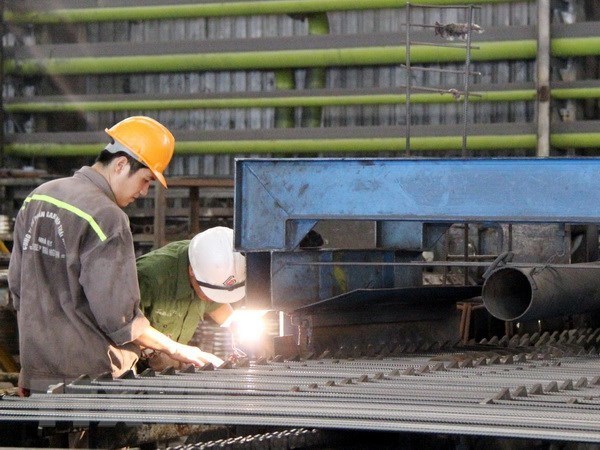 |
The US Department of Commerce (DOC) early this week issued a final order slapping duties of up to 456 percent on steel products produced in the Republic of Korea (RoK) and Taiwan, shipped to Vietnam for minor processing then exported to the US.
The DOC said in a statement that corrosion-resistant steel products (CORE) and cold-rolled steel (CR) processed in Vietnam using steel of Korean or Taiwanese origin had circumvented US duties.
According to the Trade Remedies Authority of Vietnam, a duty of up to 456 percent would be applied on CR and CORE of unclear origin.
The duties for CR and CORE using steel from the RoK were 24.2 percent and 29.4 percent, respectively and 10.34 percent for CR using steel from Taiwan.
According to the DOC’s statement, shipments of CORE from Vietnam to the US increased 4,353 percent from 23 million USD between April 2012 and December 2015 (when preliminary duties were imposed on Korean and Taiwanese products) to 1.1 billion USD from January 2016 to September 2019.
Shipments of CR rose 922 percent from 49 million USD between January 2013 and February 2016 (when preliminary duties were imposed on Korean and Taiwanese products) to 498 million USD between March 2016 and April 2019.
However, industry insiders and market researchers said they foresaw little negative impact from the move on the Vietnamese steel industry.
SSI Securities Corporation said the US’ tax imposition would not have significant impacts on Vietnam’s steel producers because most anticipated risks from the US’ trade defence measures and had worked to diversify their export markets.
ACB Securities said Vietnam’s steel export to the US only accounted for 2 percent of the country’s total steel export value. Thus, the duties would not seriously affect Vietnam’s steel export revenue but would affect certain domestic steel producers.
Nguyen Van Sua from the Vietnam Steel Association (VSA) was also nonplussed by the move.
Sua said that facing duty imposition was not a new thing for Vietnam’s steel industry, thus, many firms had prepared for this by diversifying export markets and selecting raw materials originated from countries which were not subjected to duties.
For example, Hoa Phat Group had been working to reduce reliance on the import of raw materials for its production, especially with the Hoa Phat Dung Quat Iron and Steel Complex, according to Nguyen Manh Tuan, General Director of Hoa Phat Steel Pipe Company JSC.
According to Pham Chau Giang, Deputy Director of the Vietnam Trade Remedies Authority under the Ministry of Industry and Trade, many Vietnamese steel producers were working with the US in certifying their product origins. Generally, the US’ duty imposition would not have a significant impact.
Giang said the ministry would continue to work with the industry association and trade counsellors to provide information at the request of the US investigation agency to ensure Vietnamese products enjoy fair treatment.
The Ministry of Industry and Trade also urged steel producers to use raw materials produced domestically or from countries not subjected to the duties.
According to the Vietnam Steel Association, Vietnam’s export of CORE and CR to the US hit 260 million USD in the January-October period.
The US accounted for 6.5 percent of Vietnam’s steel export volume. ASEAN was the country’s largest export market, accounting for 65 percent./.VNA

U.S. slaps heavy duties on Vietnamese steel
The U.S. Department of Commerce (DOC) on December 16 announced the imposition of duties of up to 456% on corrosion-resistant and cold-rolled steel produced in Vietnam using a substrate of South Korean or Taiwanese origin.

Former Deputy PM provided poor guidance to loss-making steel project - inspectors
Former Deputy PM Hoang Trung Hai was found to have committed violations and shortcomings in his instructions to a long-suspended, loss-making megaproject managed by State-run Thai Nguyen Iron and Steel Corporation.
 The US’ imposition of duties of up to 456 percent on certain steel products shipped from Vietnam would not significantly harm the country’s steel industry, according to industry insiders." itemprop="description" />
The US’ imposition of duties of up to 456 percent on certain steel products shipped from Vietnam would not significantly harm the country’s steel industry, according to industry insiders." itemprop="description" />